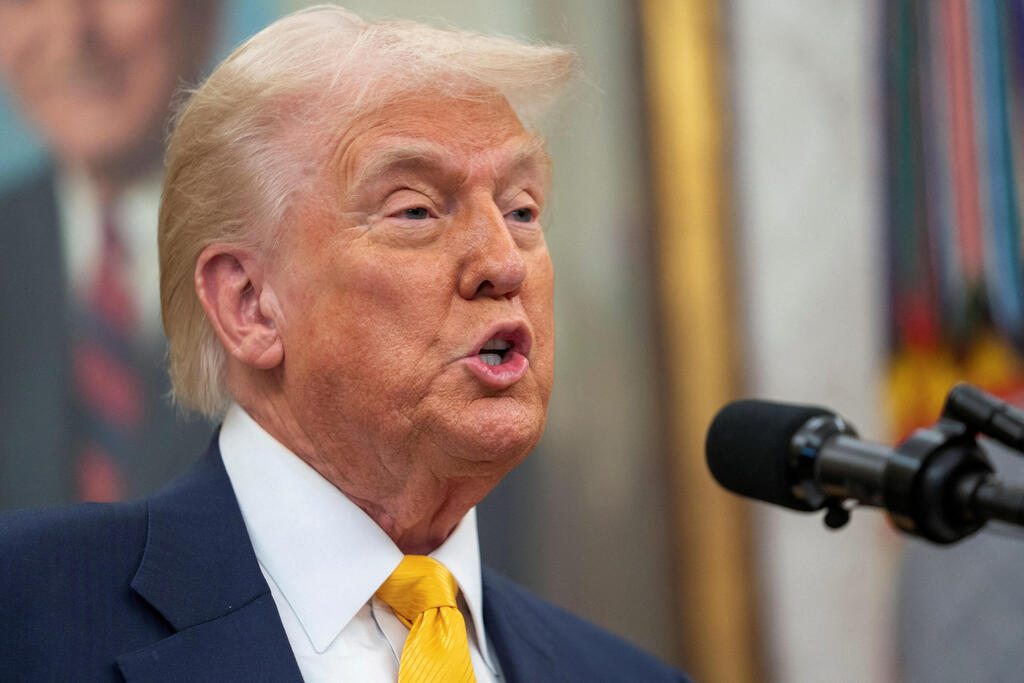The Trump administration identified the cryptocurrency industry as one of the central arenas in its economic policy and wasted no time removing regulatory obstacles that could slow its growth. Within just a month of his election, the administration dismissed one of the most significant lawsuits against Coinbase, the largest crypto exchange in the U.S., giving a massive boost to the entire industry.
3 View gallery


Eric Trump speaks at the Bitcoin MENA conference in Abu Dhabi, UAE
(Photo: Screenshot from YouTube)
The decision removed a real threat to the company’s operations and the future of crypto in the US, signaling that the new administration would fully support this market, which has become a political and economic powerhouse with unprecedented influence. With the lawsuit dismissed, Coinbase was free to list and trade cryptocurrencies issued by Trump and his wife, Melania, without concern.
Coinbase and the crypto industry celebrated, but reality quickly dampened the festivities. On the same day the lawsuit’s dismissal was announced, the Dubai-based crypto trading platform Bybit reported a breach in what became the largest crypto theft in the industry’s history. Over $1.5 billion worth of cryptocurrencies were stolen from the platform, reminding the world just how vulnerable the crypto market is, leaving small investors to fend for themselves or rely on the goodwill of corporations.
The US Securities and Exchange Commission (SEC) took an entire month after Trump’s election to act—not due to hesitation, but because the new administration needed time to remove the sitting chairman and appoint a more industry-friendly replacement. The previous chairman, Gary Gensler, had worked during his term to regulate the crypto market by applying existing financial laws, defining any cryptocurrency issued by a centralized authority as a security.
During his tenure, Gensler brought approximately 100 enforcement actions to the market, which had been eagerly awaiting his removal — a move Trump promised to make on his first day in office.
In a lawsuit filed by the SEC against Coinbase in 2023, it was alleged that the exchange endangered consumers by allowing them to trade unregistered securities, effectively operating outside the law. The language of the lawsuit threatened the very existence of a publicly traded company valued at over $53 billion and had the potential to impact the entire crypto market in the U.S., with ripple effects likely to be felt worldwide.
Paul Grewal, Coinbase’s chief legal officer, stated in an interview that, under the agreement with the SEC, Coinbase would not have to admit to any wrongdoing or pay a fine. According to him, the SEC agreed to dismiss the case with prejudice, meaning it cannot be refiled. "The case disappeared as if it had never been filed," Grewal said, marking another testament to the immense political influence of the industry over the current administration, which was pushed to abandon enforcement efforts against corporations.
When the SEC announced its investigation into Coinbase in July 2022, the company was valued at $14 billion. It faced rumors of bankruptcy, and the crypto market itself was grappling with the collapse of major companies, including the world’s second-largest exchange, FTX, and mid-sized lenders like the Israeli-American Celsius. At the time, the poor risk management of crypto firms dominated headlines as they went bankrupt one after another. Amid the collapse of FTX, Coinbase became the dominant crypto player in the U.S.
Gensler’s fight against Coinbase, as well as other crypto companies like Kraken and Binance, created a complex legal battle. Crypto firms argued that Gensler was using unfair legislation to regulate an innovative industry and demanded dedicated legislation tailored to the crypto market.
Since then, the market has recovered — thanks largely to Trump’s unequivocal support. During his election campaign, Trump promised everything the crypto companies wanted to hear: official recognition of the market as a unique financial system with its own regulations and a commitment that the U.S. government would back it. Trump even declared his intention to make the U.S. the "global crypto capital." As a result, Coinbase’s stock soared by 88% after his election, reaching an all-time high on December 5 with a valuation of $85 billion before falling by 40%. Bitcoin’s price rose by more than 40%, trading at $86,000 earlier this week.
Since FTX’s collapse, Coinbase has become the largest American exchange and the central platform for U.S. traders. The crypto market’s surge in 2024, fueled by Trump’s support, propelled the company’s performance forward. Coinbase ended 2024 with a net profit of $2.6 billion, 27 times higher than the previous year, while its revenue more than doubled to $6.6 billion — a direct result of skyrocketing crypto prices.
Bitcoin, in particular, played a significant role in the company’s performance, as trading in it accounts for about one-third of all activity on the platform, on which Coinbase collects transaction fees as a percentage of the trade’s value. Over the past year, private traders tripled their trading volume on the platform to $221 billion, while institutional traders increased their trading volume threefold to $941 billion in 2024.
Get the Ynetnews app on your smartphone: Google Play: https://bit.ly/4eJ37pE | Apple App Store: https://bit.ly/3ZL7iNv
The sharp market gains didn’t happen in a vacuum — the crypto industry rewarded Trump with aggressive support. Coinbase was one of the main funders of a $130 million pro-Trump campaign group, alongside support for other candidates who backed the industry. Coinbase’s CEO and founder, Brian Armstrong, personally donated $2 million to Trump’s inauguration fund, while the company itself contributed an additional $1 million. According to OpenSecrets.org, which tracks political donations, Coinbase spent over $46 million attempting to influence the 2024 election. According to The Wall Street Journal, after Trump’s victory Armstrong met privately with the president-elect, and the two discussed appointments for the new administration.
Trump reciprocated by implementing a series of measures that favored the industry. Among other actions, he appointed investor David Sacks, a crypto enthusiast, as the White House’s "crypto and artificial intelligence czar." Trump also rescinded a Biden-era executive order that restricted banks from holding crypto assets and appointed Paul Atkins, a securities lawyer who had previously consulted with crypto firms, as SEC chairman.
Trump announced the establishment of a crypto reserve with five currencies: Bitcoin, Ether, Cardano, Ripple, and Solana. An investigation by the investigative journalism site ProPublica revealed that Kathryn Armstrong, the sister of Coinbase’s CEO, was appointed to a senior position on Elon Musk’s government efficiency team (DOGE)—another link between the crypto industry and the new administration.
The Trump administration’s moves in the crypto market make it clear that its new policy is unequivocally tilted in favor of the industry’s large companies and corporations. While regulatory relief and political protection may accelerate market growth and increase investments, they also leave small investors more exposed to risks in an unregulated financial world. Security breaches, extreme volatility, and the absence of a regulatory safety net continue to threaten traders, who may find themselves unprotected against further collapses.
The open question remains whether Trump’s bet on crypto will lead to sustainable prosperity or another round of financial chaos that will harm those without access to the corridors of power.



